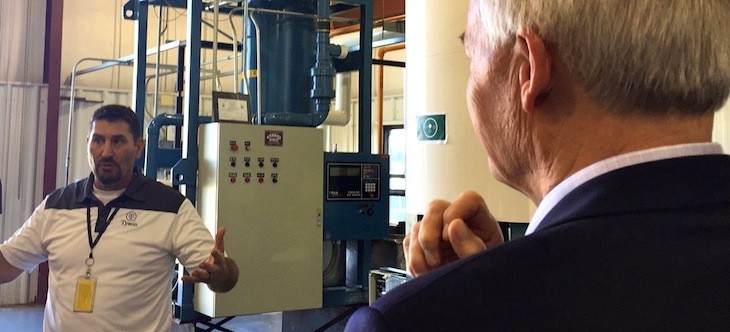Northwest Technical Institute to build $3.5 million ammonia refrigeration center
by August 1, 2018 2:33 pm 2,015 views

(from left) David Rook, associate director of refrigerated training at Tyson Foods, gives Gov. Asa Hutchinson a tour of the ammonia refrigerant training facilities at Northwest Technical Institute in Springdale on Wednesday (Aug. 1).
Northwest Technical Institute of Springdale will soon be one of only a handful of nationally accredited ammonia refrigeration training centers in the country. The career and technical training center is among only two in the state with the other center operated inside the state prison system.
NWTI, which recently rebranded by adding “W” to the acronym, plans to break ground in September on a new 19,000 square-foot building that will more than triple the capacity of its ammonia refrigeration center. The expansion will cost around $3.5 million with funding from the state and more than 17 private industry partners with a lead gift from Tyson Foods. The center will be one of only five nationally accredited training programs. Construction is expected to begin in January.
David Rook, associate director of refrigeration training at Tyson Foods, a leader in this project, was among the first graduates of ammonia refrigeration classes offered at NWTI in 1998. He said industry partners from Cargill, Simmons, Walmart and others – such as a boiler donation from Midwest Steam Boilers of Van Buren – will make this new facility state of the art. Rook said industry has been trying to slap a bandaid on a gaping hole in the available workforce need to run industrial machinery.
“We are hiring people for jobs they have not been adequately trained to do and having to train them on the job. This is not what we prefer. We haven’t been able to adequately train folks on an actual boiler before they test for the certification. This center will change that,” Rook said.
NWTI President Dr. Blake Robertson told Talk Business & Politics the new facility will allow the trade school to actively recruit students from around the country and possibly the globe given the demand for certified ammonia refrigeration technicians in the industrial maintenance field.
The program takes 11 months to complete. Robertson said the ammonia refrigeration program is graduating about 12 to 14 students a year. The new center will allow for four new classrooms and additional curriculum in boiler training allowing annual enrollment of around 75. The new center will also be able to add shorter classes — 4 to 6 weeks in length — for residual training as needed by local industry. That doesn’t exist now because of capacity restraints.
Rook said starting pay for a certified tech in ammonia refrigeration ranges from $18 to $22 per hour and could be as high as $26 an hour in some situations. He said in the next five years some 60,000 technicians will be needed in industrial maintenance because the workforce is retiring and more manufacturing is reshoring.
Gov. Asa Hutchinson spoke at Wednesday’s event and congratulated NWTI on the new phase of its development. He said there are 75 open positions in this field within a 150-mile radius of Northwest Arkansas and demand for the program is strong. He said the work to train more in industrial maintenance careers in the region and state is a good start and it’s going to take much effort and combined support from industry like this new project in Springdale.
“This program is critical to the state. There is a full commitment to NWTI because of the partnerships you have with industry. I want to call out Tyson Foods for identifying the need and then recruiting others to participate and solve this problem. … It’s important to recognize this is the only (public) ammonia refrigeration training program in the state. Demand is extraordinary in preparing workers in this field for employers such as Walmart and Tyson,” said Hutchinson. “If there’s anything I have learned about career education is you better meet the need of industry. Now let’s all work to make this expansion program a success.”
Robertson also told Talk Business & Politics NWTI will break ground on a new 13,000 square-foot building later this month for an expanded welding center. He said funding for the project came from a private donation by a Springdale family.
“We are a 43-year-old facility and we don’t get a lot of funding from the state for infrastructure. Working with the Northwest Arkansas Council we are identifying areas where we can expand with the help of industry partners who have a vested interest in the training. The ammonia refrigeration and welding are two of the area where capacity restraints have held us back, but that’s about to change,” Robinson said.
He said the new welding center will sit next to the ammonia refrigeration center and construction will soon begin because funding is in place. Because so much of the funding for the ammonia refrigeration center expansion is in-kind services that project is expected to take longer.
Rook said the ammonia refrigeration center is being designed with guidelines from Tyson’s program and they are working backward from industrial application to the training setting. He is excited about the possibilities for the center saying it will be sought out by companies across the nation. He said Tyson’s global influence could also mean it’s seen on the world stage. He said poultry partners of Tyson Foods in Brazil sent their workers to the U.S. for training in ammonia refrigeration at a competitor school. He said the new expanded capacity and additional coursework like hands-on boiler training and certification will set this center apart from competitors.
Robertson said NWTI has post secondary enrollment of roughy 325 students and another 350 high school students also use the center for industrial and technical training for high school credit in programs such as dental assistants, welding, or diesel mechanics.
